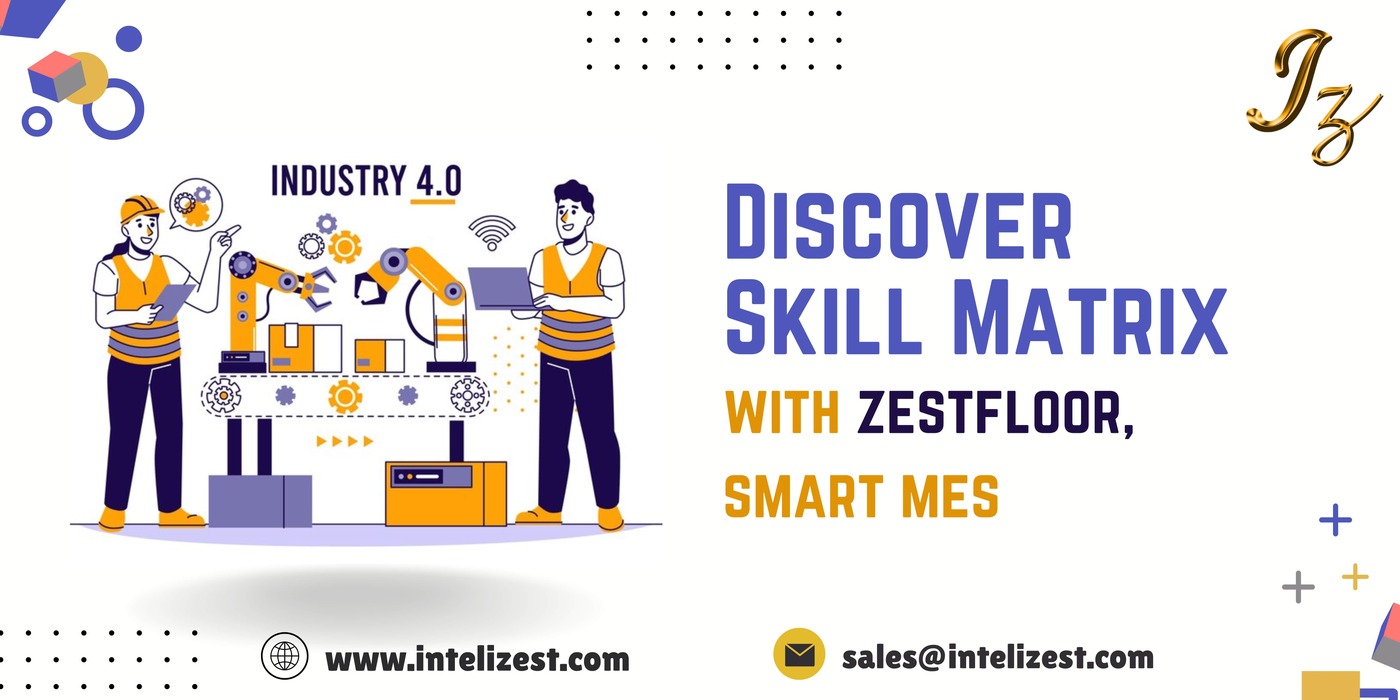Maximizing Shop Floor Efficiency: The Benefits of Using a Skill Matrix with ZestFloor Smart MES

Introduction
In the competitive world of manufacturing, maintaining a highly skilled and efficient workforce is crucial. One effective tool for achieving this is the skill matrix, which maps out employee skills and proficiency levels. When integrated with advanced solutions like ZestFloor Smart MES, a skill matrix can transform shop floor operations, driving employee retention, upskilling, task assignment, succession planning, competitive edge, progress monitoring, and client satisfaction. Here’s a closer look at the benefits and challenges of using a skill matrix in manufacturing.
Challenges in Implementing a Skill Matrix
1. Data Accuracy and Maintenance:
- Keeping the skill matrix accurate and up-to-date requires continuous effort. Manual updates can be time-consuming and prone to errors.ZestFloor Smart MES addresses this challenge by automating data collection and updates, ensuring that the skill matrix reflects the current state of the workforce accurately.
2. Employee Resistance:
- Employees may resist skill assessments, fearing negative consequences. Overcoming this requires transparent communication and demonstrating the benefits for their career growth. ZestFloor Smart MES can provide a user-friendly interface and clear benefits, encouraging employee participation.
3. Complexity in Large Organizations:
- For large manufacturing setups, creating and maintaining a skill matrix can be complex. The integration of ZestFloor Smart MES simplifies this by offering scalable solutions that can handle large datasets and complex organizational structures.
4. Initial Setup Time:
- Setting up a skill matrix requires an investment of time and resources. However, the long-term benefits far outweigh the initial efforts. With ZestFloor Smart MES, the setup process is streamlined, allowing for quicker implementation and faster realization of benefits.
Benefits of Using a Skill Matrix on the Manufacturing Shop Floor
1. Employee Retention:
- : A skill matrix helps in identifying employee strengths and areas for development, leading to targeted training and career development programs. This fosters a sense of growth and progression, which enhances job satisfaction and reduces turnover. ZestFloor Smart MES provides real-time insights into skill levels, making it easier to tailor development plans that keep employees engaged and committed.
2. Upskilling and Reskilling:
- As technology and processes evolve, continuous learning becomes essential. A skill matrix highlights the areas where employees need upskilling or reskilling, ensuring that the workforce remains competent and versatile. ZestFloor Smart MES can track training progress and outcomes, ensuring that employees acquire the necessary skills to meet evolving demands.
3. Task Assigning:
- Assigning tasks based on employee skills and proficiency ensures that the right person is doing the right job, leading to higher efficiency and quality. The real-time data from ZestFloor Smart MES allows managers to make informed decisions when assigning tasks, optimizing productivity and reducing errors.
4. Succession Planning:
- : Identifying and developing future leaders is vital for long-term success. A skill matrix helps in spotting high-potential employees and planning their career paths. With ZestFloor Smart MES, managers can track employee progress and readiness for higher responsibilities, ensuring a smooth transition during succession.
5. Competitive Edge:
- A well-maintained skill matrix ensures that the workforce is always aligned with industry standards and best practices, giving the company a competitive edge. ZestFloor Smart MES enhances this by providing actionable insights and benchmarks that help maintain high performance levels.
6. Progress Monitoring:
- Regularly updating the skill matrix allows for continuous monitoring of employee progress and skill development. ZestFloor Smart MES automates this process, providing real-time updates and comprehensive reports that help in evaluating training effectiveness and making necessary adjustments.
7. Client Satisfaction:
- A skilled and efficient workforce directly impacts product quality and delivery times, leading to higher client satisfaction. By ensuring that the right skills are in place and continuously developed, a skill matrix, supported by ZestFloor Smart MES, helps in maintaining high standards and meeting client expectations consistently.
Leveraging ZestFloor Smart MES for Skill Matrix Management:
ZestFloor Smart MES (Manufacturing Execution System) is a comprehensive solution that integrates seamlessly with skill matrices, offering a host of features that enhance their effectiveness:
1. Real-Time Data Integration:
- ZestFloor Smart MES collects real-time data from the shop floor, ensuring that the skill matrix is always up-to-date.
2. Automated Skill Tracking:
- The system automatically tracks and updates employee skills based on their performance and completed tasks.
3. Enhanced Analytics:
- With powerful analytics tools, ZestFloor Smart MES provides deeper insights into skill gaps, training needs, and workforce efficiency.
4. User-Friendly Interface:
- The intuitive interface makes it easy for managers and employees to access and update the skill matrix.
Conclusion
A skill matrix is an indispensable tool for manufacturing organizations aiming to optimize their workforce and achieve higher levels of efficiency. By integrating it with advanced solutions like ZestFloor Smart MES, manufacturers can overcome common challenges and unlock the full potential of their teams. Embracing this strategic approach not only enhances productivity but also fosters a culture of continuous improvement and employee engagement, paving the way for sustained success in the competitive manufacturing landscape.











